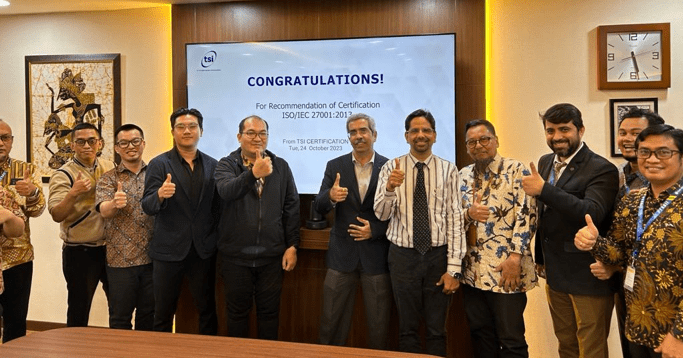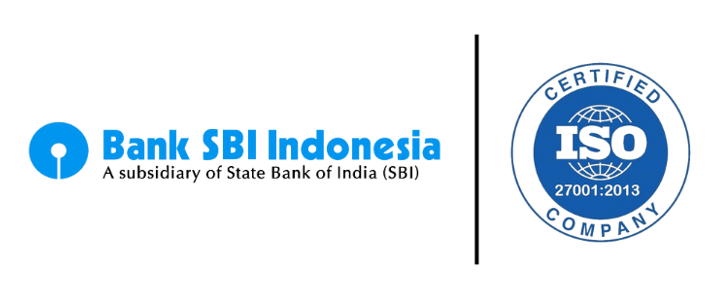
Enhancing Security and Trust: Bank SBI Indonesia Implements ISO 27001
ISO 27001 is an internationally recognized standard for information security management systems (ISMS). ISO 27001 plays a crucial role in helping the organizations to safeguard their information assets, comply with legal requirements, enhance business reputation and improve operational efficiency through effective risk management and continual improvement processes.
Implementing and maintaining ISO 27001 certification offers several specific benefits for banks and financial institutions as mentioned below:
- Improved Business Processes: Implementing ISO 27001 often leads to improved business processes and efficiencies, as it requires organizations to document and standardize their information security procedures. Certification can be a differentiator in competitive markets, as it provides assurance to customers that their information is protected and that the organization always adheres to international standards.
- Improved Security Posture: ISO 27001 helps organizations to improve their overall information security by providing a systematic approach to managing sensitive company information, ensuring it always remains secure. Due to the requirement of continuously monitor, review, and improve their ISMS, enable organisations to ensure that security measures evolve alongside changes in the organization and the threat landscape.
- Risk Management: The standard emphasizes a risk-based approach to information security, helping organizations identify, assess, and mitigate risks effectively. By identifying and mitigating risks, ISO 27001 can help reduce the likelihood and impact of security incidents such as data breaches. Compliance with ISO 27001 helps organizations to meet legal and regulatory requirements related to information security, data protection, and privacy.
- Enhanced Customer Confidence: ISO 27001 certification demonstrates to customers and stakeholders that the organization takes information security seriously and has implemented best-practice security measures. Internally, ISO 27001 fosters a culture of security awareness and responsibility among employees, suppliers, and other stakeholders, resulting in enhancing overall trust in the organization’s operations.

PT Bank SBI Indonesia finished the thorough process of ISO 27001:2013 certification and received the certification for the ISO/IEC 27001:2013. With this, the management of Bank SBI Indonesia has been registered by TSI as conforming to the requirements of ISO/IEC 27001:2013. For more information, visit our website at www.sbiindo.com.
Best Practices
Risk Assessment and Management: ISO27001 Certification encourages organisation to conduct regular and comprehensive risk assessments to identify and prioritize information security risks. It also enables Banks to consider risks related to financial transactions, customer data, regulatory compliance, third-party dependencies and Implement risk treatment plans to mitigate identified risks effectively.
Leadership and Governance: Key to implement ISO 27001 is feasible only once commitment and support from senior management and executives is in place. It also ensures that Senior Management is involved in the process to prioritize information security within the organization from the beginning. Establishing clear roles and responsibilities for information security governance enable organisations to ensure that security objectives are aligned with business goals. Involvement of Senior Management is key in developing the culture of Security within the organisation.
Security Awareness and Training: Organisation are encouraged to conduct regular security awareness and training programs for employees to educate them about information security risks, policies, and procedures. It enables to foster a culture of security awareness and responsibility throughout the organization.
Access Control: Implement strong access control measures to ensure that only authorized individuals have access to sensitive information and systems. Use techniques such as role-based access control (RBAC), multi-factor authentication (MFA), and segregation of duties (SoD) to minimize the risk of unauthorized access.
Monitoring and Audit: Implement continuous monitoring of information security controls and systems to detect potential security incidents or anomalies. Conduct regular internal audits and assessments to evaluate the effectiveness of the ISMS and identify areas for improvement.
BANK SBI INDONESIA,
Graha Mandiri Building (Plaza Bumi Daya Building)
15th Floor,
Jl. Imam Bonjol No. 61,
Jakarta Pusat 10310 – INDONESIA
Telp : (+62 21) 398 38747
Fax : (+62 21) 398-34051
Web : www.sbiindo.com



